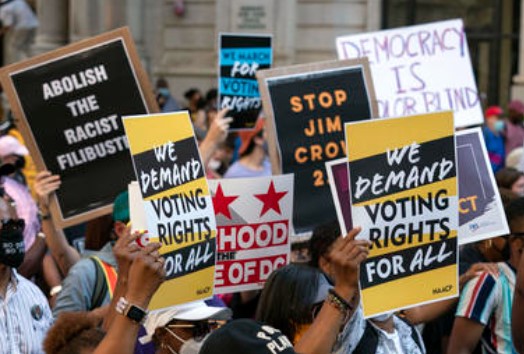Any hope that our country’s elite political journalists might heed the increasingly clamorous calls from former colleagues and media critics to adopt a pro-democracy approach to their coverage pretty much died this week.
Actual pro-democracy reporting doesn’t simply entail writing movingly about its death. A genuine pro-democracy reporter would also write – obsessively — about what would help it survive. But the reporters covering the White House and Congress today express no real curiosity about that topic.
The current push to pass ambitious voting-rights and election-protection legislation may be the last chance our republic has to bolster our democracy before it takes some serious damage.
But top news outlets have been covering it like any other partisan dogfight — without any sense of urgency, without crucial context, and without even explaining what’s in the bills in question. They have, consequently, failed to explain why those provisions are there, why they are essential, how commonsensical they are for the most part, and how opposition to them is based solely in the Republican Party’s preparations to rule as a permanent, authoritarian minority government.
The lack of curiosity may be what kills me the most, as a journalist. How deadened these reporters (and their editors, and their newsroom cultures) must be to not want to explore ways to save our democracy.
And when they do cover the topic, they do so almost grudgingly. President Biden’s powerful, historic speech on Tuesday describing what’s in the bills and demanding action even if that means changing filibuster rules only made it to the fourth slot in the CBS Evening News that night, after a medical helicopter crash, Covid, and a cold snap.
By Thursday, the story had fallen off the front pages of the New York Times and the Washington Post.
Top editors, it would seem, are just fine having reporters cover this story with the same anachronistic, algorithmic combination of false equivalence, distance, and deadened tone that has been their go-to for political journalism for decades. To them, conflict is exciting, policy is boring, and democracy reform is particularly boring.
There’s no real sign, so far, that they’re going to change. And they sure as hell failed the test this week.
The Pleas
This comes after a period of months during which a growing chorus of former political reporters, media critics and others have been calling on newsrooms both to increase their coverage of democracy erosion – and to openly fight it.
This is hardly a new argument. I made it a year ago, and it wasn’t new then.
But for a few months, it seemed like it was building momentum.
The Washington Post’s Dana Milbank – once a White House correspondent, now an opinion columnist – challenged his former colleagues in December:
How about being partisans for democracy? The country is in an existential struggle between self-governance and an authoritarian alternative. And we in the news media, collectively, have given equal, if not slightly more favorable, treatment to the authoritarians.
In an interview with me, Milbank said journalists’ training and experience didn’t prepare them for covering a political party trying to undermine democracy itself. “I think we need a rethink entirely how we do things,” he said.
NYU journalism professor Jay Rosen told CNN’s Brian Stelter:
I think the first thing is news organizations have to come out and say, we are pro-democracy, pro-truth, pro-science, pro- evidence, pro-voting. Then they have to figure out for each of those new pros, what practices are we going to retire because they don’t meet that standard, and what are we going to start to do routinely that we didn’t do before?
Mother Jones CEO Monika Bauerlein called on journalists to “cover democracy like it matters.”
And Washington Post media columnist Margaret Sullivan despaired that “news organizations are not making democracy-under-siege a central focus of the work they present to the public.” She called, in particular, for a “new emphasis on those who are fighting to preserve voting rights and defend democratic norms.”
Our top editors and reporters this week responded by giving us all the finger.

NPR has been relentlessly on top of this, in my experience. They were also way ahead of other outlets in calling the claims of election fraud, the « steal, » etc a « lie, »which it is, when others used every possible euphemism. Are they not considered a « major news outlet? »
Yes, but NOR waited until after the 2020 election, to call aie a lie, and only after other major outlets began doing so. Basically, NPR waited until it no longer get mattered.
Wouldn’t the demise of democracy hurt the business of the free press? Why don’t they see it as an existential threat?
I suspect that, in addition to the standard it-can’t-happen-here conviction, it’s because the business model — like most business models — is focused on the short-term. And if past is prologue, the press will wail about infringements of liberty only when there is something specific to the press. When it comes to the infringement of others’ rights, stenography and both-sides-do-it will do just fine.
I suspect most of the political “reporters” (there are some notable exceptions of course) are building their portfolios so they can apply for PR positions in the new regime.
It’s all about the infotainment, which includes Harris’ French cookware, Trump hanging up on his interviewer, antivax celebrities who die of covid and other stuff that’s the equivalent of rubbernecking at a car crash. Amazing, too, is how one-sided the coverage is of the Project Veritas story where the First Amendment is never even mentioned.